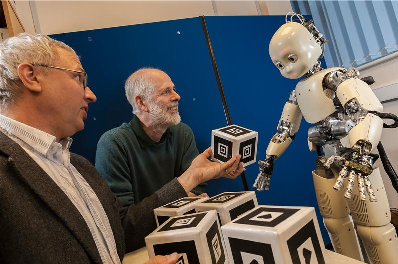By Kalwinder KaurJun 14 2012
Researchers at the University of Hertfordshire reported that robots can develop basic language skills by interacting with a human. The results of the findings were published in PLoS ONE.
 The iCub robot named DeeChee learning basic language with Professor Chrystopher Nehaniv and Dr Joe Saunders
The iCub robot named DeeChee learning basic language with Professor Chrystopher Nehaniv and Dr Joe Saunders
Dr Caroline Lyon, together with Dr Joe Saunders and Professor Chrystopher Nehaniv has performed experiments. The researchers worked on the iTalk project, wherein childlike iCub humanoid robot demonstrates the evolution of language learning skill. At first, the robot can just babble. It recognizes speech as a string of sounds without being parted into words. But following ‘conversation’ with humans for some time, the robot adapted its output by becoming familiar with the frequently heard syllables. The participants interacted with the robot by talking to it similar to a small child. As a result of instruction, the robot was able to utter some word forms like the names of simple shapes and colours.
According to Dr Caroline Lyon, the fact that infants are sensitive to the frequency of sounds in speech have been demonstrated by these experiments as it reflects the method of modeling the sensitivity that results in mimicking the word forms by a robot.
Just like a student learning process, the iTalk project instructs the robot to speak. This innovative initiative forms a major part in the learning process of the human-robot interaction. Unlike the iCub robot, the iTalk project’s research includes learning the meanings of words. These technologically scientific innovations will lead to an advanced generation of interactive robotic systems in future.
Disclaimer: The views expressed here are those of the author expressed in their private capacity and do not necessarily represent the views of AZoM.com Limited T/A AZoNetwork the owner and operator of this website. This disclaimer forms part of the Terms and conditions of use of this website.